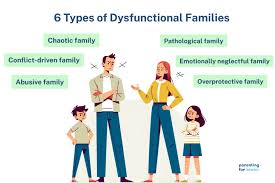In our community, family is the foundation of our lives, and we take pride in the strength of our family bonds. However, no family is perfect, and all families experience some level of dysfunction.
The extent of this dysfunction varies, and it can have a profound impact on the psychological and physical well-being of family members.
In this article, we’ll explore the characteristics of a dysfunctional family, the roles family members often take on, and the practical steps you can take to heal and lead a balanced life within our cultural context.
Family dynamics and roles
To understand a family’s level of dysfunction, it’s crucial to examine its dynamics. Severe sibling rivalry, parental and child conflicts, domestic violence, mental illness, sexual abuse, substance abuse, unemployment, gambling, and extramarital affairs are all factors that can dramatically affect the family unit and cause lasting dysfunction.
 In our community, these issues may be further complicated by cultural expectations, societal pressures, and the importance placed on maintaining family unity.
In our community, these issues may be further complicated by cultural expectations, societal pressures, and the importance placed on maintaining family unity.
In dysfunctional families, members often adopt specific roles to help the family cope with challenges.
The “mama figure,” often the mother or an elder sibling, works tirelessly to maintain harmony in the household, even when faced with difficult situations. They may mediate conflicts between family members, provide emotional support, and prioritize the family’s well-being above their own needs.
The “oga at the top,” usually the firstborn or a hardworking son or daughter, takes on the burden of providing for the family and ensuring their success. They may work multiple jobs, excel in their studies, and sacrifice personal goals to meet the family’s needs and expectations.
The “wahala pikin,” often a younger sibling or a family member who feels misunderstood, may engage in behavior that goes against family norms or societal expectations. They may struggle to find their place within the family and may be criticized or blamed for the family’s problems.
The “quiet one,” perhaps a reserved or introverted family member, may withdraw from family drama and seek solace in their own pursuits. They may feel overlooked or unimportant in the family dynamic, but find ways to cope through personal interests or by focusing on their own growth.
Finally, the “chief jester,” often a charismatic or humorous family member, uses their personality to bring laughter and joy to the household. They may use humor to diffuse tense situations, provide a distraction from family problems, or simply try to keep the family’s spirits up during difficult times.
Characteristics of a dysfunctional family
Dysfunctional families in our community may exhibit various characteristics, such as abuse (physical, sexual, or verbal), emotional abuse (neglect, constant criticism, or controlling behavior), conditional love, lack of boundaries, lack of intimacy, triangulation (using a third person to communicate instead of direct communication), and addiction.
These issues can be further complicated by cultural norms, religious beliefs, and societal expectations.
The causes of family dysfunction can include a history of mental illness, health issues, physical or verbal abuse, or unexpected life challenges like job loss, which can lead to stress, frustration, and even domestic abuse.
In our community, these factors may be compounded by economic hardship, limited access to resources, and the pressure to maintain a certain image within society.
Practical steps to healing from dysfunctional upbringing
Growing up in a dysfunctional family can leave many scars, but healing is possible. Here are some practical steps you can take within our cultural context:
• Seek guidance: Look for a trusted elder, religious leader, or counselor who understands our community’s values and can provide support and advice as you navigate the healing process.
• Practice respectful assertiveness: In our culture, respect for elders and family hierarchy is crucial. However, as an adult, you have the right to express your thoughts, feelings, and needs in a calm, clear manner that honors both your well-being and cultural values.
• Engage in self-care: Take care of your physical, emotional, and mental health by eating well, exercising regularly, getting enough sleep, and practicing stress-reduction techniques that align with our cultural practices, such as prayer, meditation, or spending time in nature.
• Build a support system: Surround yourself with positive, supportive people within our community who uplift and encourage you. This can include friends, mentors, or support groups for individuals from dysfunctional families who share our cultural background.
• Educate yourself: Read books, articles, or attend workshops that address family dysfunction and personal growth from a perspective that resonates with our community’s values and experiences.
• Practice forgiveness: In our culture, forgiveness is often tied to spiritual beliefs and the importance of maintaining family harmony. Focus on forgiving yourself and others for the sake of your own well-being and the well-being of your family and community.
• Create new family traditions: If you have children or a family of your own, create new, healthy traditions that foster love, respect, and open communication while honoring our cultural heritage. This can help break the cycle of dysfunction and strengthen family bonds.
• Set realistic expectations: Healing is a process, and it takes time. Be patient with yourself and celebrate small victories along the way, recognizing that progress may look different in our cultural context.
• Develop a self-care plan: Create a personalized self-care plan that includes activities that bring you joy, relaxation, and a sense of accomplishment, while respecting our community’s values and traditions. This can help you maintain balance and resilience as you navigate the healing process.
• Seek support within our community: Look for support groups or organizations within our community that address family dysfunction and provide a safe space to share your experiences, learn from others, and find validation and encouragement from people who understand our cultural background.
Remember, healing from a dysfunctional upbringing is a journey, and everyone’s path is unique. Be kind to yourself, celebrate your progress, and don’t hesitate to reach out for help when needed.
By drawing strength from our cultural values and traditions, and using them to guide your healing process, you can break the cycle of dysfunction and build a healthier, more fulfilling life for yourself and your loved ones within our community.


